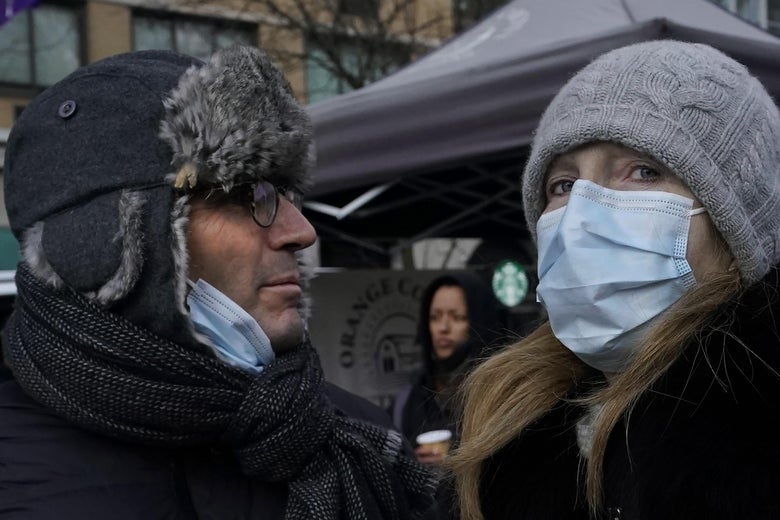
Tourists wearing masks walk through Union Square in New York City on February 28, 2020, amid fears of the coronavirus and a global pandemic.
TIMOTHY A. CLARY/Getty Images
The financial markets plunged into a state of abject panic this week, thanks to the novel coronavirus. As the rising number of COVID-19 cases fanned fears that a recession could be on the way, stocks fell at record speed. Investors also piled into government bonds, sending yields to new lows, a sign that the world’s money guys are desperate for safe bets as the possibility of a true pandemic becomes real.
Why is the coronavirus such a menacing economic threat?
The first, most obvious answer is that the disease could disrupt life and commerce as the world knows it. Global supply chains are already getting scrambled, as much of China, the world’s factory, has been put on lockdown. Chinese consumers have stopped shopping, hurting sales of everything from cars to iPhones. Tourists are staying home. And if coronavirus truly washes across the U.S.—as public health officials seem to expect—it could prevent Americans from going to the office, their favorite restaurants, or the movies. As people’s daily routines grind to a halt, so too could the economy.
That brings us to the second, less obvious concern that’s contributing to the climate of fear: If the coronavirus does cause a severe economic slump, the normal playbook for fighting recession might not work very well.
Here’s why: Most downturns are the result of what economists call “demand shocks.” Some financial calamity befalls the country—gas prices spike, a stock bubble bursts, or housing prices go into freefall—or the Fed hikes interest rates too aggressively, and as a result, businesses and households cut back spending. When this happens, the government has plenty of ways to respond. Central bankers can cut interest rates, to encourage more borrowing and investment. Lawmakers can increase government spending or lower taxes, in order to get businesses humming and put money in people’s pockets.
A budding pandemic is likely to be different. For starters, it creates demand problems that can’t necessarily be solved by putting money in people’s pockets; families aren’t going to spend a tax cut on a trip to Disney World if they’re afraid to go out in public. At the same time, as The Economist’s Ryan Avent pointed out earlier this week, coronavirus is also threatening to create a “supply shock,” by simply cutting off access to goods and services. Slashing interest rates won’t help a factory that suddenly can’t get supplies from China, or whose workers are stuck at home. And families also can’t spend their tax cut on that Disney vacation if the park is closed to prevent the virus from spreading.
None of this means that policy makers should just sit by and watch misfortune unfold. On Friday, Federal Reserve Chair Jerome Powell said that he and his colleagues stand ready to intervene as necessary to stabilize the economy. But in the end, it’s just not clear how much he, or anybody else who isn’t in charge of a public health response, can do.
Issue number three: People are worried that a recession brought about by coronavirus could trigger landmines that have seemingly been waiting to explode in the financial world. China watchers have long worried about the massive amount of iffy lending undertaken by the country’s banks. Those risks could now come to a head as the country’s economy slows. In the U.S., a decade of low interest rates has led to a junk bond boom, particularly among energy companies. With oil prices falling, it’s possible that many drillers could default on their debts, many of which have been diced up, repackaged, and sold to investors as “collateralized loan obligations.” Few people expect the fallout out to be as bad as the Great Recession, but it could deepen any downturn.
Fourth, there’s just the sheer uncertainty of it all. Nobody has any real frame of reference for what’s coming the world’s way right now. Outbreaks like SARS and swine flu haven’t prepared us for a hard-to-spot, wildly contagious pathogen. We don’t know what the public health and economic damage will be. And we don’t know what knock-on effects it could trigger. We have few answers and plenty to be afraid of. As always, the markets are worried about fear itself.
Readers like you make our work possible. Help us continue to provide the reporting, commentary and criticism you won’t find anywhere else.
Join Slate Plusfrom Slate Magazine https://ift.tt/39bNnKu
via IFTTT
沒有留言:
張貼留言